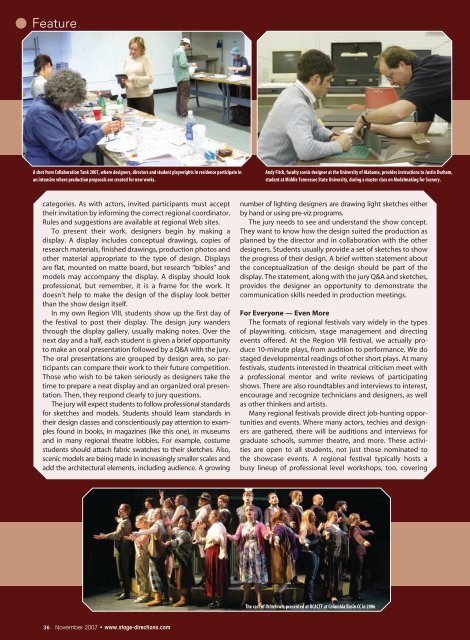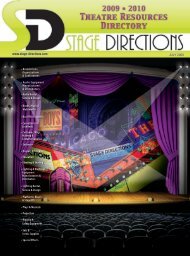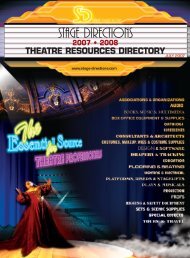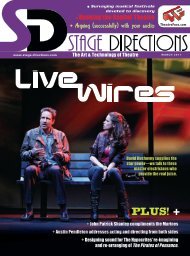Download a PDF - Stage Directions Magazine
Download a PDF - Stage Directions Magazine
Download a PDF - Stage Directions Magazine
You also want an ePaper? Increase the reach of your titles
YUMPU automatically turns print PDFs into web optimized ePapers that Google loves.
Feature<br />
Porfirio J. Solorzano<br />
Porfirio J. Solorzano<br />
A shot from Collaboration Tank 2007, where designers, directors and student playwrights in residence participate in<br />
an intensive where production proposals are created for new works.<br />
Andy Fitch, faculty scenic designer at the University of Alabama, provides instructions to Justin Durham,<br />
student at Middle Tennessee State University, during a master class on Modelmaking for Scenery.<br />
categories. As with actors, invited participants must accept<br />
their invitation by informing the correct regional coordinator.<br />
Rules and suggestions are available at regional Web sites.<br />
To present their work, designers begin by making a<br />
display. A display includes conceptual drawings, copies of<br />
research materials, finished drawings, production photos and<br />
other material appropriate to the type of design. Displays<br />
are flat, mounted on matte board, but research “bibles” and<br />
models may accompany the display. A display should look<br />
professional, but remember, it is a frame for the work. It<br />
doesn’t help to make the design of the display look better<br />
than the show design itself.<br />
In my own Region VIII, students show up the first day of<br />
the festival to post their display. The design jury wanders<br />
through the display gallery, usually making notes. Over the<br />
next day and a half, each student is given a brief opportunity<br />
to make an oral presentation followed by a Q&A with the jury.<br />
The oral presentations are grouped by design area, so participants<br />
can compare their work to their future competition.<br />
Those who wish to be taken seriously as designers take the<br />
time to prepare a neat display and an organized oral presentation.<br />
Then, they respond clearly to jury questions.<br />
The jury will expect students to follow professional standards<br />
for sketches and models. Students should learn standards in<br />
their design classes and conscientiously pay attention to examples<br />
found in books, in magazines (like this one), in museums<br />
and in many regional theatre lobbies. For example, costume<br />
students should attach fabric swatches to their sketches. Also,<br />
scenic models are being made in increasingly smaller scales and<br />
add the architectural elements, including audience. A growing<br />
number of lighting designers are drawing light sketches either<br />
by hand or using pre-viz programs.<br />
The jury needs to see and understand the show concept.<br />
They want to know how the design suited the production as<br />
planned by the director and in collaboration with the other<br />
designers. Students usually provide a set of sketches to show<br />
the progress of their design. A brief written statement about<br />
the conceptualization of the design should be part of the<br />
display. The statement, along with the jury Q&A and sketches,<br />
provides the designer an opportunity to demonstrate the<br />
communication skills needed in production meetings.<br />
For Everyone — Even More<br />
The formats of regional festivals vary widely in the types<br />
of playwriting, criticism, stage management and directing<br />
events offered. At the Region VIII festival, we actually produce<br />
10-minute plays, from audition to performance. We do<br />
staged developmental readings of other short plays. At many<br />
festivals, students interested in theatrical criticism meet with<br />
a professional mentor and write reviews of participating<br />
shows. There are also roundtables and interviews to interest,<br />
encourage and recognize technicians and designers, as well<br />
as other thinkers and artists.<br />
Many regional festivals provide direct job-hunting opportunities<br />
and events. Where many actors, techies and designers<br />
are gathered, there will be auditions and interviews for<br />
graduate schools, summer theatre, and more. These activities<br />
are open to all students, not just those nominated to<br />
the showcase events. A regional festival typically hosts a<br />
busy lineup of professional level workshops, too, covering<br />
The cast of Urinetown, presented at KCACTF at Columbia Basin CC in 2006<br />
36 November 2007 • www.stage-directions.com

















